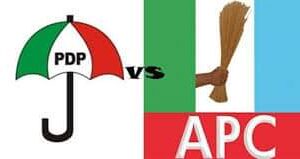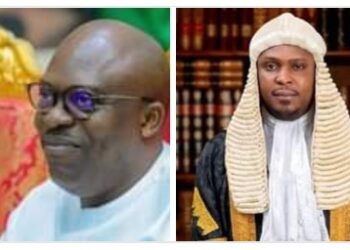EMEKA NZE examines the implications of non- elective convention being adopted by the Peoples Democratic Party (PDP), for the party’s National Convention coming up in August
Since the Peoples Democratic Party (PDP) announced that its National Executive Committee, (NEC) has ratifi ed a non -elective convention on August 12th, 2017, party faithful, supporters, observers and analysts have expressed concerns over the decision and even made a subject of national discourse. Expectedly, while some favour it, others see it as a continuation of PDP’s culture of impunity being expressed through imposition of candidates and party executives rather than the fi ne tradition of democratisation, a major albatross of the party.
To those, however, who believe in the non -elective convention, the reasons adduced by the party leadership are very germane and plausible that if undermined could engender constitutional crisis and attract sanctions by the Independent National Electoral Commission (INEC). 74th NEC According to the party’s spokesman, Prince Dayo Adeyeye, at the 74th NEC last week, the party cannot meet up with the constitutional requirement of 21 working days long notice to the INEC, hence the need to opt for a non -elective convention. Section 31(2A) of the Electoral Act (as amended) has prescribed that 21 working days notice should be given to INEC and other relevant agencies before holding an elective convention.
Adeyeye explained that the National Caretaker Committee (NCC) elected at the Port Harcourt Convention of May 21, 2016 had its tenure extended by 12 months at another botched convention at Port Harcourt on August 17, last year when security agencies could not allow the party access to the venue. He further explained that the tenure of the NCC will elapse on August 16 to pave way for the election of new party executives on August 12 this year as has been announced by the party. While some party members and observers would have preferred an elective convention, the party said a nonelective convention is best suited in this circumstances given the long period of litigation which terminated on the July 12 Supreme Court verdict. Implication of Supreme Court Judgement By implication, had the Supreme Court judgement come a bit earlier than it did, the party would have met the long notice 21 days requirement as prescribed by the Electoral Act for the conduct of an elective convention.
Th e spokesman, Adeyeye during the 74th NEC meeting made the following lurid explanations: “We took a decision on the National Convention. I want to inform you that if you recollect, on May 21st last year, there was a national convention in Port Harcourt which set up a caretaker committee. “Th at committee went about doing its work and convened another Convention for August 17 last year. Th at Convention in Port Harcourt could not elect new offi cers due to certain circumstances.
Th e convention then asked the National Caretaker Committee to continue in offi ce for 12 months, which will lapse in August 16, 2016. “We have been in court since May 2016. So, the prolonged litigation of the National leadership tussle ended only last week on 12th of July when the Supreme Court PDP: Implications of non-elective convention While some favour it, others see it as a continuation of PDP’s culture of impunity being expressed through imposition of candidates and party executives, rather than allow the fine tradition of democratization gave judgement in favour of the National Caretaker Committee, leaving barely one month for the conduct of proper elective national convention, taking into account the relevant statutory notice that we need to give to INEC and other agencies the requirements of the Constitution. “Practically, it is going to be impossible to have an elective national convention before August 16 because we need to give certain statutory notices to INEC. And our own has some special provisions that we have to meet and there’s no time to meet up with those provisions. “
Th erefore, NEC took a decision that on view of all the circumstances, NEC invoking the powers conferred on it under Section 31 (2a), decided to convene nonelective national convention on August 12, 2017 in Abuja, Adeyeye explained. Rubber –Stamp Makarfi -led NCC Some have, however, argued that the essence of opting for a non- elective convention is to rubber -stamp the Senator Ahmed Makarfi -led NCC into a substantive National Working Committee (NWC). Taking it further, proponents of this view said this amounts to impunity and lack of internal party democracy that resulted in the protracted crisis in the fi rst place, which shook the party to the roots and threatened to obliterate it from Nigeria’s political scene.
Th ose who call for caution explained that PDP from inception have had a history of imposition at the intra elections and should have given PDP a fresh berth after the Supreme Court judgement by electing new sect of leaders to run the party. Th ose who hold this opinion recalled how previous conventions of the party rubber stamped already handpicked leaders and foisted them on the party members against their wish, thereby further polarizing it. Tukur’s Example For example, at the convention where Alhaji Bamanga Tukur was adopted as national chairman, a former acting secretary of the party, Musa Babayo was said to be a more popular candidate but the then presidency preferred older Tukur and ensured his emergence as the national chairman.
Th e manner in which other leaders emerged in the party was not remarkably diff erent from this draconian style which produced Tukur. In fact, the PDP while in power was noted for a top- to- bottom system of producing its leaders instead of the reverse. Th e top to bottom approach is where the almighty presidency highly infl uential party bigwigs such as governors pick party chairmen along with other party offi cials and the delegates merely affi rm those handpicked at a national convention. Th is system of producing leaders also predominantly accounts for why such leaders are removed unceremoniously when they could no longer do the bidding of their masters.
Audu Ogbeh A classic example here is the former national chairman of the party, Chief Audu Ogbeh, who was shoved aside by former President Olusegun Obasanjo when the romance was over between them. Accusing fi ngers are being pointed at the governors of the party especially, Nyesom Wike and Ayodele Fayose of Rivers and Ekiti states respectively as those who now play the role of former PDP presidency by seeking to railroad the NCC to a full swing NWC. Th e Makarfi -Sheriff rift decided recently at the Supreme Court has variously been described as an off shoot of executive overzealousness of the governors who imposed the former Borno state governor, Senator Ali Modu Sheriff as party national chairman in an abracadabra against the wish of majority of party members.
Th e boomeranging eff ect was that when the romance was over, Sheriff cashed in on the perceived overzealousness and adapted his mission in PDP to one of sanitization and rescue from executive lawlessness. His preachments were centered on curbing the excesses of the governors and the powerful Abuja politicians by whittling down their overbearing infl uences on the party which more often than not, manifested through impositions of their will against the popular will. Sheriff vowed, albeit in vain now, to return the party to the grassroots. However as germane as the argument for an elective convention might be, matter of fact, the constitutional ground as adduced by Adeyeye seemed to have knocked it off . Equally, there is also the reason for party stability in aftermath of the Supreme Court judgement. Th is view supposes that as good as national convention seems, it is a time for extreme politicking within the party. Extreme politicking is arguably divisive rather than unifying, thus what the party needed now as analyst have noted, are those unifying factors that can return it to a consolidated and formidable platform. To this extent, the NCC if transformed into an NWC by the non -elective national convention, can be less contentious, and perhaps, work for a more conducive environment for the much needed reconstruction and reconciliation with the view to achieving stability at least for the next one year before an elective convention can be conducted. Incompetent, Disunited Th ose who hold this view emphasize the need for the party to defeat the “incompetent and disunited” ruling All Progressives Congress (APC) come 2019 general elections and underscores PDP unity as an indispensable ingredient to attain the feat.



